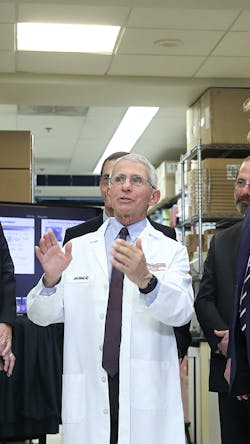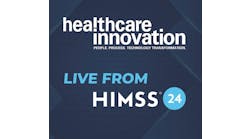Anthony Fauci, M.D., was upbeat about vaccine development in a Nov. 16 talk to the virtual AMIA symposium, but he warned about how grave the current pandemic situation is, and bemoaned the fact that local public health systems are underfunded and not in a good position to respond to pandemics.
Fauci, director of the National Institute of Allergy and Infectious Diseases (NIAID) at the U.S. National Institutes of Health, engaged in a lively fireside chat with Patricia Brennan, R.N., Ph.D., director of the National Library of Medicine.
Brennan began by asking what Fauci was focused on right now. He mentioned that the vaccine development appears to be going far better than he would have predicted. But at the same time, the case numbers are rising dramatically across the country. “We are right now in the middle of a serious surge the likes of which we have not seen,” with 11 million infections and 245,000 deaths, he said. He noted that just a few weeks ago when he testified before the Senate, we were at 40,000 new cases a day and he warned if we did not get it under control we could get to 100,000. Yesterday we had more than 166,000 new cases.
He said now in the cooler weather of fall and upcoming winter weather, when people do more things indoors rather than outdoors, we have to double-down on fundamental public health things to prevent infections, such as wearing masks and avoiding crowds and congregate settings. "We should make the hope of a vaccine motivate us even more to be very stringent and attentive to fundamental, simple, doable public health measures.”
Fauci said that although much of this vaccine work is being done by private companies, the NIH has been involved in the basic research that led to these developments from the beginning. “All these interventions started off in somebody’s lab with a creative idea,” he said. “We are working day and night on basic research.” Besides vaccine research, NIH also is working on monoclonal antibodies to help prevent someone from getting advanced disease. He said we have good therapies for people late in disease progression but we need drugs for early disease. NIH also is working on state-of-the-art, point-of-care sensitive home diagnostic kits. NIH is also studying “post-COVID syndrome,” in which people have persistent symptoms after their bodies have cleared the virus.
Fauci said data sharing needs to be open and that data sharing really should be mandated as part of research contracts with grantees. He added that data needs to be shared in a way that people can actually utilize it, and that “negative results are as important to share as positive results.”
When Brennan asked Fauci where we should be investing to prepare for the next pandemic, he mentioned public health readiness. “Years ago, prior to elimination of some diseases, local public health systems were robust and sound. We could have used them now. Because they were victims of their own success, he added, we let them dwindle by not funding them adequately. “We need to rebuild local health systems and strengthen the global health security network and agenda. We need a network of committed, transparent surveillance systems that are interconnected and transparent to the world. “Microbes will emerge. We are not going to prevent the emergence of infections. That is what pandemic preparedness is all about. If you prepare well, you will respond well. Chasing a pandemic is not a good formula for success.”
He said there are so many things we need better data on, such as how many people have undetected community infection. “We need that data about silent community spread.” If we had known that early on, he said, we would have gotten more aggressive testing people without symptoms.
There are other issues that are going to require informatics expertise, Fauci said. He was asked about the potential of “immunity cards,” but he said that since we don’t know enough about protective immunity, “that is not in the cards for now. Immunization registries, however, will be important, he said.
Asked about misinformation being spread and “groupthink” among community groups, he said we have seen divisiveness, with wearing a mask becoming politicized. On the flip side, he said that community efforts can be positive, such as in Native American communities that traditionally listen to elders. That is an example of the positive aspect of communities working together on prevention, “but it can be just as dangerous in the opposite direction.”
He reminded the audience that it is science that is going to get us out of the pandemic. "I think we need to start teaching science as early as we possibly can! For those who have an inclination to it, it's so exciting it's almost like love at first sight."


